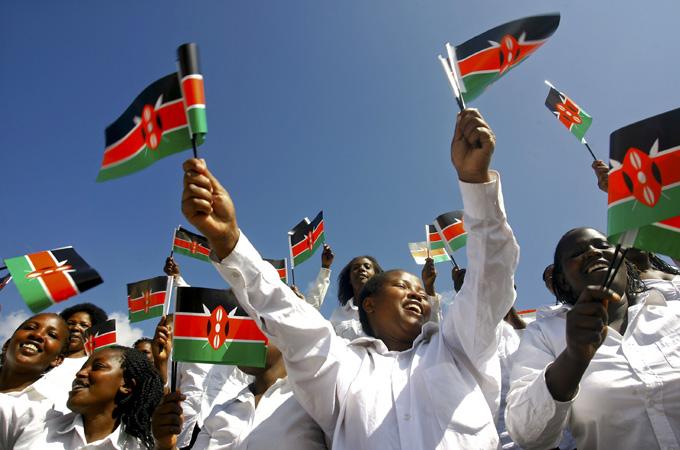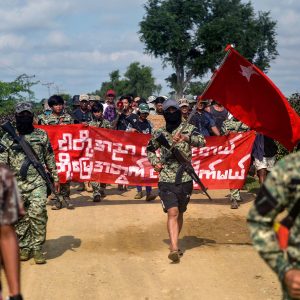NAIROBI – On the eighth of August, Kenyans across the nation lined up in front of the polling stations and proudly exited with ink-stained fingers as their bodily evidence of democracy. Reigning president Uhuru Kenyatta was elected for a second term in office and international observers such as the European Union and the Carter Center praised the election for being peaceful, free and fair. However, only three weeks later, the Supreme Court of Kenya made a historic ruling when it nullified the election. Chief Justice David Maranga contended that the election had been tainted by illegalities and irregularities, including five million unverified ballots, and ruled it unconstitutional on those grounds. Although the unprecedented ruling created hope amongst supporters of the opposition coalition NASA (National Super Alliance) and their leader, longtime politician Raila Odinga, the ensuing weeks would turn their hope into despair and disgruntlement.
In Nairobi, “Kikuyu businesses” have been boycotted in areas where Luos and Luhyas reside so as not to fuel pro-government associates. But the ethnic cleavages express themselves far more conspicuously than business boycotts. Kenya’s political system is deeply ethnicized and to many Kenyans, the presidential election means that the winner (and thus his ethnic group) takes it all. According to the constitution, a reelection has to be held within sixty days after a nullified election. However, it was clear to many that both the electoral and the political issues of Kenya would not resolve within that timeframe.
In protest of the sustained controversies around the voting system, Odinga decided to boycott the reelection. With no viable opposition candidate on the ballot incumbent, Kenyatta won the election with 98%. However, some counties failed to hold an election, voter turnout numbers have ranged from just 27% to 48%, and some numbers have allegedly been manipulated. As a result, NASA with Odinga at its helm has refused to acknowledge the victory of Kenyatta and has instead proclaimed his own inauguration ceremony as the president of “people’s republic” to be held in the near future.
This election year has been long, and Nairobians I talk to overwhelmingly just want to go “back to normal.” The country’s economy has been suffering from the uncertainties brought about by the election and reelection. Political violence has erupted amongst opposition supporters in the slums, and police have responded with brutality. The painful memories of the post-2007 election violence when more than 1,100 people were killed and over 600,000 were internally displaced still loom over the country. Many seek answers to the urgent question of how such political violence can be avoided.
Ethnicization of politics in Kenya has been a powerful political tool throughout the country’s modern political history. As in many former colonies, colonial powers were the original engineers of Kenyan social cleavages, which were fostered to perpetuate their rule. Indeed, the British did not allow for party formation in Kenya other than along ethnic lines, a policy whose legacy can be seen in the present political system.
On the eve of independence in 1963, the Kenya that was part of the colonial government stroke a deal to buy back the land from the British in the so-called “one million acre scheme.” As a result, the Kenyans in power, with Jomo Kenyatta a Kikuyu in the lead, were entitled to distribute the land in accordance with their personal preference. With ethnicity as the only party affiliation marker, the land was distributed to show support to, and in turn gain support from, their own ethnic group. While giving the privilege of land primarily to Kikuyus, other ethnic groups obviously fell behind which was the start of the current marginalization, disempowerment, and deprivation of rights of some ethnic groups.
This vicious cycle has been perpetuated through the stark centralization of power, concentrated in the presidency. Since independence, every president has conspicuously favored development in the regions where their ethnic group reside, as well as ethnicized the cabinet and other crucial branches of government. The post-election violence in 2007 was, by and large, the explosive response to these political inequalities.
In an attempt to mitigate this trend, the 2010 constitution implemented an ambitious devolution process. By dividing the country into 47 sub-counties that control their own local budgets, the devolved system has obvious merits. However, these county governments still rely on the president and the national government for funding, and suspicions of the government favoring certain counties due to the ethnicity of their residents are still prevalent. Despite the good intentions of the devolution reforms, they are unable to properly address the underlying historical issues of land conflict and social marginalization.
Consensus prevails amongst Kenyans: until the historical injustices are resolved and the tribalism within the government is put to an end, the democratic state of Kenya will be crippled.
Featured image source: Al Jazeera






Be First to Comment